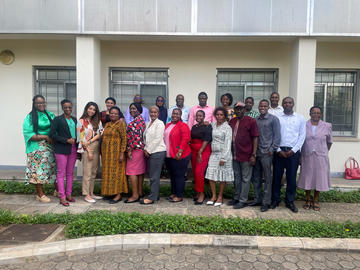Members from the Global Parenting Initiative (GPI) recently hosted a scale-up lab with implementation partners in Tanzania.
“The main objective of the scaling lab was to share and gather stakeholders' ideas on the vision for scaling up evidence-based parenting interventions in Tanzania. We also worked to identify drivers and barriers to scaling, propose intervention delivery channels and potential policy tools to facilitate scale-up of parenting interventions nationally,” says Saara Thakur, the GPI scale-up lead, from the University of Oxford.

The scaling lab workshop took place from 25 to 28 July 2023, at the National Institute for Medical Research (NIMR) Campus in Dar Es Salaam. The core internal GPI scaling team, implementation partners from Parenting for Lifelong Health, Clowns Without Borders South Africa (CWBSA), Investing in Children and their Societies (ICS), NIMR, as well as representatives from the Tanzanian Ministry of Community Development, Gender, and Children as well as the Ministries of Home Affairs and of Education, the World Health Organisation (WHO), United Nations Educational, Scientific and Cultural Organization (UNESCO), the United Nations Children's Fund (UNICEF), Pact, Transforming Lives, and Plan International attended.
Thakur led the discussions with a key focus on gathering diverse perspectives and insights to create a strategic roadmap for scaling up the project effectively.
Successful scaling labs and engaged participation
The interactive scaling labs and stakeholder meetings were successful. They fostered active participation and shared discussions, leading to a productive exchange of ideas. The data gathered will help shape the national scaling strategy.
Government representatives' enthusiastic participation highlighted their strong support for the project, making it an asset for scaling and a positive indication for future implementation.
Civic societal organisation partners also showed interest in contributing to the scaling process, stressing the need for a robust and effective scaling strategy.
Key takeaways and next steps
The following actions were agreed upon:
-
Forming a national parenting consortium: All stakeholders agreed to form a national parenting consortium, which would provide an important national platform for all stakeholders to work together to ensure that parenting and prevention of VAC remain high on the national agenda.
-
Speak in one voice and advocate for policy implementation: Stakeholders upheld that the consortium would enable the stakeholders to speak in one voice on parenting issues in the country. It would also enable them to advocate for parenting policy implementation at the national, regional, and community levels.
- Religious networks recognised as vital institutions for expanding the initiative: It was agreed that engaging religious leaders could significantly enhance the impact of the project's message on communities throughout Tanzania.
- Preference for the parenting program to bear Tanzanian values was strongly expressed: The participants expressed the need to focus on creating a solution that aligned with the country's culture and values, in close collaboration with local experts.
- Strong commitment to publicise the initiative through the media: This demonstrated the government's dedication to the project's success and its intent to provide a safer and more nurturing environment for Tanzania's children.
Moving forward, the team will carefully analyse the wealth of information gathered during these sessions to identify the most pertinent insights. The next steps involve further meetings and workshops to refine the scaling plan, consortium formations, clarify roles and responsibilities, and ensure a cohesive and effective collaboration among consortium members.
“The Scaling Labs have exemplified a collaborative and dynamic endeavor, uniting the remarkable voices of diverse stakeholders, coming together to envision the future of parenting in Tanzania. Together, we were able to identify pivotal factors that will empower us to work as a collective force, building a robust foundation of innovative strategies so we may extend the reach of parenting support to those who need it most,” says Thakur.